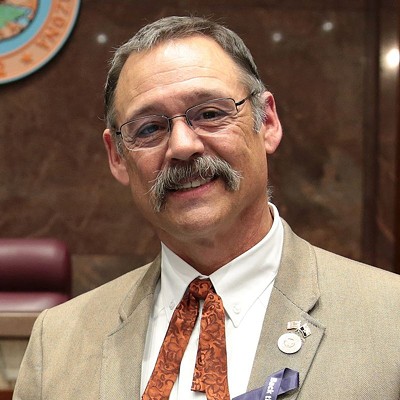HEALTH-CARE HYPOCRISY
There were mounds of bullshit created during last year's congressional campaigns, but one mound that stunk more than others was the GOP's complaint that Democrats, as part of their health-care reform law, had cut Medicare by $500 billion.
It struck us then as a bogus scare tactic—and our takeaway is validated by the fact that nearly every congressional Republican has now embraced the same cuts that they decried last year.
The Democrats' Affordable Care Act did indeed reduce future spending on Medicare by a projected $500 billion—with the savings coming from reducing payments to doctors and hospitals, and other reforms. Whether those savings will actually materialize remains to be seen, but it was an effort to attempt to bend the curve of future Medicare costs.
One of the key cuts was roughly $136 million over the next 10 years from Medicare Advantage, which started out as an experiment to show that the private sector could deliver health-care services at a lower cost than the government.
Here's how that experiment went: Medicare Advantage ended up costing the government more than traditional Medicare—somewhere around 14 percent more, which meant that the federal government showered insurance companies with about $44 billion more than it would have paid had seniors just stayed on traditional Medicare.
Since Medicare Advantage is obviously not succeeding in its goal of delivering services more cheaply than the government, ObamaCare reduced the amount of money that would be paid to insurance companies as part of Medicare Advantage. The companies could still bid on contracts, but there'd be less money available to them.
Republicans across the country, including Jesse Kelly in his unsuccessful campaign against Congresswoman Gabrielle Giffords, made the Medicare Advantage cut a centerpiece of their campaign against incumbent Democrats.
In his typical fact-challenged fashion, Kelly went so far as to say that Giffords had eliminated Medicare Advantage, when, in fact, insurers are still offering the plan to seniors—but getting less of a subsidy from the government.
It's ironic enough that Republicans campaigned against finding cuts to government, but here's the final twist (and you may have heard this elsewhere): The Republican House embraced those very same Medicare Advantage cuts when they voted to support Rep. Paul Ryan's budget plan.
Overall, the Ryan budget, with its explicit dismantling of Medicare to pay for tax cuts for the wealthiest Americans, is proving to be extremely unpopular with voters, according to just about every poll that isn't rigged. If you think voters like the idea of telling seniors to buy their own damn health insurance from benevolent insurance companies, you'd better take another look at that Democratic win in a very GOP upstate New York district last month.
Despite its unpopularity with voters, the GOP has doubled down on the Ryan plan, with Republican senators voting in favor of it last month. Both Sen. John McCain and Sen. Jon Kyl supported the plan—including the cuts to Medicare Advantage.
Back in November, The Skinny asked Kyl about those Medicare Advantage cuts. Kyl said he was strictly opposed to cuts to Medicare Advantage, arguing that the cuts were meant to discourage people from signing on with Medicare Advantage.
"People who didn't like the private-sector alternative were trying to make it less-attractive," Kyl said.
So why support the cuts now? We don't know Kyl's reasoning, because Andrew Wilder, a spokesman for Kyl, didn't get back to us when we contacted him to ask about it.
We can imagine what Wilder might have said if he'd called us back (it's easy, because it's Ryan's spin as well): The cuts to Medicare were bad when they were supported by Democrats, because that money was going to be used to fund health-care coverage for younger Americans without health insurance—but the same cuts are OK when it means you're pushing everyone (including senior citizens) into the private marketplace.
But that argument reinforces the underlying problem that makes the Ryan plan politically toxic: The vouchers that Republicans would give future senior citizens in the place of Medicare would not keep pace with inflation, which means that seniors will have to spend more out-of-pocket money on insurance. And the entire scheme assumes that insurance companies are going to want to cover geriatric Americans who face huge health-care expenses.
If Medicare Advantage has taught us anything, it's that the government is actually more efficient at reining in health-care costs than the private sector.
WE'RE NOT DIGGING THIS
Officials from Canadian-owned Augusta Resource Corp. were no doubt twirling their pick-axes last week, after a federal analysis of their proposed mine revealed little leverage to stop it.
But Augusta's minions might not want to pop the corks just yet. And they may wish to recheck their already meager ethics after reading through a document filled with dire warnings of environmental havoc should the project move forward. Not that the suits at Augusta—nor their shareholders and shameless local lackeys—have ever shown much concern about the ghastly damage the mine would inflict upon the Santa Rita Mountains south of Tucson.
Ah, but we digress.
While Augusta's proposed mine would stretch across roughly 900 acres of private property, it would also require more than 3,000 acres of adjacent Forest Service land to use for processing.
Back in 2006, when Augusta first announced plans to dig the massive open-pit copper mine, company officials predicted a seamless permitting process. Much of their confidence emanated from the federal Mining Act of 1872, which was originally meant to encourage mines on public lands and now makes it nearly impossible to stop them, unless they can be shown as potential violators of environmental laws.
That was certainly the tone abundant in the Forest Service's draft environmental impact statement, wherein Coronado officials time and again noted that they may lack the legal leverage to block the mine.
Yet the document contained a lengthy litany of impacts on the Rosemont Valley and surrounding areas. That predicted damage ranges from drastic groundwater reductions to the massive destruction of habitat for 27 at-risk species, from the Chiricahua leopard frog to the jaguar.
Ultimately, this paradox highlights the archaic absurdity of a law that would allow such a horrendous project to move forward.
That said, it would be a huge mistake to think the fight is even close to finished, says Roger Featherstone, director of the Arizona Mining Reform Coalition. Instead, he believes that current and planned lawsuits, as well as possible mine mitigation demanded by the Coronado, could doom the project.
"I don't think anybody would expect the modern-day Forest Service to outright deny a mine," says Featherstone. "They never have, and they keep going back to this bullshit about how they're mandated to allow mining to happen. But we have yet to see the mitigation they might require, and that's going to be the big thing."
SET YOUR TIVO
If you miss Jim Nintzel on KUAT Channel 6's Arizona Illustrated, you'll be happy to know that you'll get a chance to see your humble Skinny scribe discuss this year's races for the Tucson City Council with Christopher Conover this Friday, June 10. Arizona Illustrated airs at 6:30 p.m.















